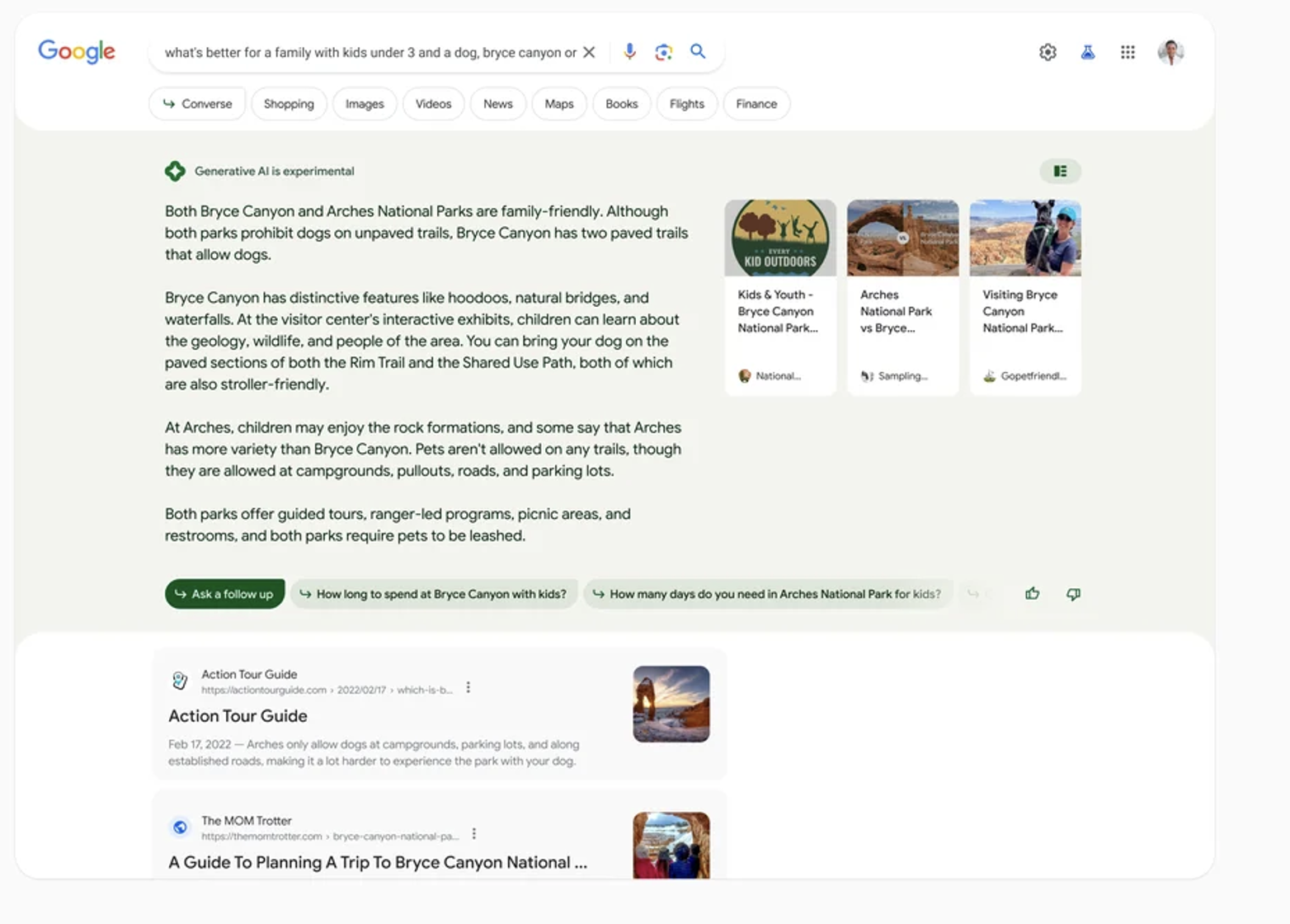Google’s Generative AI Experience + The Future of Search

Google’s newest addition to the search experience promises users a more contextual result powered by the support of generative AI. Previously known under the code name “Magi,” this latest development unveiled during the May I/O keynote presentation intends to draw the attention of users who have turned their search attention to spaces like Amazon and TikTok and return interest to traditional search engines.
As the genesis of AI-supported features continues to evolve, and brands begin to harness the power of AI technology, many are wondering how this advancement will impact the world of search and what marketers can do to stay prepared.
What makes Google’s AI experience unique?
Described broadly as an “AI snapshot,” Google’s latest feature, dubbed the Search Generative Experience (SGE), aims to give users a more contextualized, relevant result curated from information collected throughout the web and presented as a “personality free” alternative to other AI technology. Similar to other AI chat functions, users will have the ability to ask a question or start a conversation, and SGE will provide an at-a-glance view of results presented in a snackable and easy-to-digest format.
Google’s generative AI product called “Converse” would live as a new tab and produce results directly above the search results listing, taking the place formerly held by the “quick answer.” The tool will serve results in a multi-sentence conversational format that provides responses that can later be expanded by providing additional information or follow-up questions. As Google explains, “context will be carried over from question to question, to help you more naturally continue your exploration. You’ll also find helpful jumping-off points to web content and a range of perspectives that you can dig into.”

Example of the AI-generated “Converse” tab from Google’s I/O conference.
Unlike other AI competitors, Google’s SGE tool places a stronger emphasis on providing sources for results and expanding findings with relevant thumbnails, links, and resources. Describing this as a part of an ongoing focus on data “corroboration,” Google will not credit a singular website or voice; instead, providing a variety of related sources to give users a more holistic view of the topic at hand. This development provides an extra layer of credibility to results by confirming that answers can be supported or reaffirmed by more than one subject matter expert.
What type of content will be most impacted?
Although Google’s SGE tool has the ability to provide information on a wide range of topics and ideas, the search giant has made it clear that they are taking a cautious approach to specific queries. Material that falls under the YMYL (your money, your life) umbrella, including searches related to finance and healthcare, will not be serviced by the generative AI function in order to avoid “information gaps” in topics considered critical or life-altering.
During the keynote presentation, Google also alluded to this protection covering a wide range of civic topics, saying that “just as our ranking systems are designed not to unexpectedly shock or offend people with potentially harmful, hateful, or explicit content, SGE is designed not to show such content in its responses.”
Based on Google’s public demonstrations of the tool, as well as expanded features for shopping and product offerings, the content most likely to be affected appears to be within the lifestyle ecosystem, including (but not limited to) travel, arts and entertainment, commerce, and similar fields. Although the impact on these categories has yet to be determined, it can be assumed that brands operating within this space should pay considerable attention to optimization opportunities for both new and existing content.
How will this affect Google’s shopping and paid results?
Shopping-related content within results presented by Google’s generative AI will provide users with additional information meant to deliver a broader snapshot of “noteworthy factors” for consumers to consider. Designed to make the purchasing journey “faster and much easier,” this tool will provide searchers with an assortment of results including reviews, visuals, comparisons, product descriptions, and up-to-date costs that can differ and evolve based on the follow-up questions and other context provided by the user to the AI.
Based on a user’s communication with SGE, and the specific context in which they frame their search, Google hopes to transform the digital shopping experience and deliver richer recommendations based on an individual’s needs and preferences. Google clarified that SGE is built to support the search engine’s current Shopping Graph model, indicating that paid advertising space will still be at play, integrating dedicated paid slots into the AI-generated shopping results.
From a broader paid search perspective, it will be important to adopt Google’s new features to ensure brands can capture the searches happening in this new landscape. Using campaign types like Performance Max may become mandatory to gain access to this inventory. Google says 15% of searches they see every day are new, and this number will only grow as searches more closely mirror natural language. Therefore, tactics like using broad match keywords may become more important in order to capture all the natural language people will use when searching with generative AI.
When is this change coming?
As of May 11, 2023, Google reports that SGE will be available in the coming weeks for users who sign up for Google Search Labs testing. This experimental option will reportedly be the first phase of the generative AI rollout, while a broader expansion to U.S. and global users has yet to be announced.
While the SGE function will likely be available to all users in the near future, it is important to note that this functionality still requires an explicit opt-in from users. Those who choose not to opt-in for AI assistance will still reportedly receive traditional search results with no defined changes to the SERP landscape.
Key takeaways & considerations
With this next step in search innovation, Google has opened the door to an exciting new frontier that will bring a wide variety of opportunities for both brands and consumers.
Although the expansion into generative AI may initially inspire caution or additional questions, it is important to note that SEO and content optimization are more critical than ever to overall digital success. The addition of generative AI into search could impact content structure recommendations and may prompt brands to examine their evergreen content to ensure the AI is fed the most accurate, up-to-date information when answering searchers’ branded questions. However, the fundamentals of search engine optimization have not been impacted by this development.
While SGE and the new delivery of results represents an evolution of the existing search landscape, it does not indicate wholesale change or replacement. Brands seeking to retain or expand their search presence should remain focused on providing detailed and relevant content and looking toward recommendations outlined by previous algorithm revisions such as the Helpful Content Update.
Collective Measures continues to monitor changes in the Google search landscape as well as the evolution of generative AI’s impact on content and paid opportunities. The following topics will be monitored closely to stay ahead of any changes to the search landscape and to proactively recommend any shifts to approach and methodology:
- Desktop versus mobile presentation with SGE. How will results appear on both formats and how will the inclusion of generative AI results impact the visibility and placement of top results?
- YMYL (financial, healthcare). Will Google indefinitely avoid serving results with generative AI and how will similar AI competitors address this topic?
- What can lifestyle brands do to optimize existing and planned content for generative AI search results?
- What will the adoption rate look like for SGE and how will consumers respond to the new results format?
- How will reporting success be impacted if SGE is widely adopted? Will clicks to brands go down but impressions for successful brands rise?
- What will the impact be on paid advertisements and how should brands adjust or alter strategy based on these changes?
The approach to SEO is more critical now than ever before, and brands who wish to stay ahead of the curve should ensure sites are technically sound, focus on optimizing current content and fill in content gaps to best position their brand in this evolving search landscape. Brands who would like to assess the health of their SEO or content ecosystem before the change takes place are encouraged to consider an opportunity assessment as a performance baseline and to outline potential optimizations.
In the short term, nothing is truly changing right now for searchers or brands. Google will still provide a “traditional” search experience for most searchers for some time to come. However, savvy marketers will take Google’s dedication to generative AI seriously and begin to prepare for a future world where AI-provided content is part of our collective search experience.



